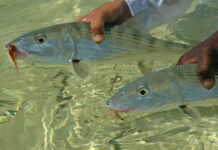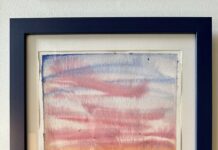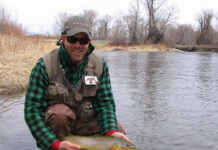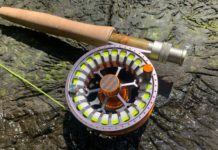Shoulder blades of a house, one left, one right; both browned by afternoon suns.
Mouths of two bedroom windows, opened wide.
The outline of my grandparents, my grandma smelling like coffee and lavender soap, their shapes still pressed in their beds.
Something said and phrased by the throat of a wren, a morning filled with the language and shape of vowels.
The dead profiles of a Ford and Buick left to rust in the bramble, one turning left, the other turning right.
My father’s ’59 Impala, its tires spinning, gambling on the slush of mud season;
the teeth of its wide grill grinning like a set of new braces.
Two trout sewn to the bottom of a stream.
A fluttering, like that of a cage of dime store finches.
A village of cattails gone fallow, darkened and numbed like fingers wrapped tight by a string.
A man on one leg, begging. Another, dragging his shadow along with him.
Two baskets of flowers hung from the antlers of a bike.
The outline your lips left on bathroom tissue.
A lover’s socks piling up under the sheets.
The smell of your breasts.
Footprints, in the soft sand behind us.
You, coming apart in my hands, under the torque of our love.
A native of California, Ronald Lewis has lived in Vermont since 1979. Lewis was a senior accountant for a number of businesses, including Vermont Law School, Dubois & King, Frog Hollow Craft Centers and VELCO. He has been a fly-fishing guide for 17 years, a well-known fly-tyer of super-realistic fly patterns, a gold prospector, a collector of vintage Valentine cards and the editor of the Vermont Poetry Newsletter & Poetry Event Calendar. He is a 21-year member of the Otter Creek Poets, former officer and web master of the Poetry Society of Vermont, and has been a continuing member of a small panel to select Vermont’s poet laureate every four years. He lives with his wife in Brandon.
I love the intermingling in this poem of the human and nonhuman, the animate and inanimate, with qualities of one left lingering on the other. A unique kind of sensuality fills the poem from the start with the opening line, The shoulder blades of a house … browned by afternoon suns, and the next line, mouths of two bedroom windows open wide. Who wouldn’t want to go in this house? We can feel already how much life it’s held and by the end of the third line, it has been brought fully alive with all five senses.
The poem feels a bit like a portrait of house past merging with house present where the speaker now spends time amid these remnants of its former lives. Like a lot of good poems, it doesn’t tell us everything. We get enough of a setting, but we’re left to fill in some of the blanks. Whose lipstick print is that on the tissue, whose socks? And do we really need to know? After all, the title is Rorschach, suggesting a montage of images doing their own thing, apart from the rational mind which insists on certainty and explanation. Anything and everything can live in a Rorschach or a tapestry or a collage, all of which the poem feels like at one point or other. And everything does live here — old cars, finches, even two trout sewn to the bottom of a stream, a wonderfully whimsical image suggesting life interrupted, or held in suspension.
What does come through clearly for me is a love story. A story of love for this house with so much character, of the grandparents whose energy still feels so present, and of the speaker and the love he has found in this home. But it feels like none of that could have happened quite this way without this particular house with its browned shoulder blades and its bedroom window mouths open wide. Its unique sounds, aromas and textures lingering at every turn.
Susan Jefts is a poet and educator from Ripton and the southern Adirondacks. Visit manyriverslifeguidance.com to learn more about her work.
Credit: Source link






























